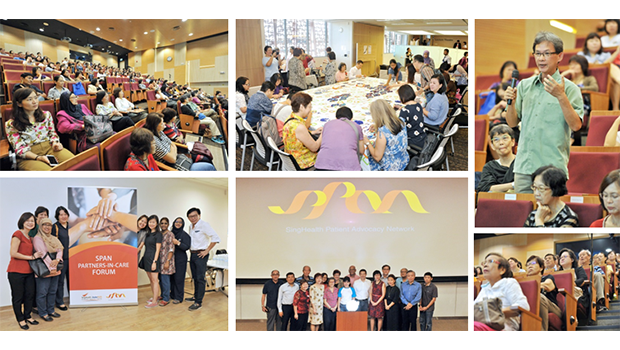
The days of ‘doctor knows best’ are over. Today, patients are being engaged and empowered to become partners in their own care, and this is said to improve outcomes.
The official launch of the SingHealth Patient Advocacy Network (SPAN) and its first forum, is testimony that SingHealth recognises patients as integral members of the healthcare team.
Comprising volunteer patients and caregivers, SPAN members lend their weight to healthcare delivery by participating in various institution committees and acting as advocates for other patients on matters such as patient safety.
The Partners-in-Care forum brought together patients, caregivers and healthcare professionals to share stories, ideas, best practices and healthcare journeys. Organised by SPAN and the SingHealth Group Office of Patient Experience, the forum made it clear that patient voices are much needed in today’s healthcare.
Doctor knows best, but …

Prof Kenneth Kwek who gave the opening address, with his individual glass mosaic - a contribution towards the “River of Life” artwork.
Patient voices are extremely important, said Prof Kenneth Kwek, Deputy Group CEO (Organisational Transformation and Informatics) SingHealth; and CEO, SGH, who gave the opening address.
He said, “Doctors and healthcare professionals may have more medical knowledge but we must move away from the ‘doctor knows best model’ of care and ask ourselves what is the best experience for patients. We need deep conversations to better understand what’s truly important to them, then shape our care to cater to this.”
“We need a fundamental rethink when planning care and facilities for patients. Now is the best time to do it, with new buildings coming up needing new facilities and services. It’s the best time to shape our thinking processes to ensure we incorporate the views and ideas of patients.”
He said SPAN will be a platform to empower patients to influence the kind of care they receive. “SPAN is something we want to leverage on. We need now to take it to the next level, engage more people more deeply, to see how we can really improve our system.”
| Forum participants also heard from the two SPAN chairpersons who shared their journey from patient to patient advocate. When it hit home, hard!
Ms Ai Ling Sim-Devadas, one of the two SPAN Co-chairs, used to be the go-to person for friends and family with health queries, accompanying them to consultations, helping to ask intelligent questions, and being the rational decision maker and coordinator. But all that changed when she, herself, was diagnosed with breast cancer. “Overnight, my world crumbled. I was devastated. I became a patient. I knew how to navigate the system but that was about all. I was as scared, fearful and worried as the next patient.” During treatment, she found that the medical care was excellent, but some things could be more patient-centred. A thought occurred to her: Why not use this experience as a patient, in her work as a healthcare communications trainer and consultant. “I never really got into the heart of healthcare until I was diagnosed. When you go through a life-changing event like this, you begin to examine your life, look at the meaning behind things you do. So, I’m glad for the opportunity to grow the seed of that idea and be part of SPAN, to help grow and build the patient experience.” No emotional support to be found
The other SPAN Co-chair, Mr Ellil Mathiyan Lakshmanan’s sense of humour did not desert him even after he received two devastating cancer diagnoses. While being prepped for surgery for rectal cancer, they found he also had testicular cancer. “Buy one get one free,” he said to laughter at the forum, adding that he now needs to wear a permanent stoma (stool bag). “It wasn’t easy trying to come to terms with it.” While full of praise for the medical teams, he was disappointed that there was no support for patients with a permanent stoma. “It was quite something to have this and no one to talk to.” He relied on online groups for information on coping with the condition, until one day he was invited to join the Singapore General Hospital’s Colorectal Cancer Support Group. “It really helped. I learnt many things from patient ambassadors and it was comforting to know that I did not walk the journey alone. That’s when I decided that I should do more.” Since then, he has played an active role in SPAN. “It’s a good platform to represent patient’s ideas and provide the hospital with a patient’s perspective,” he said. |

Dr Gilbert Fan, Master Medical Social Worker, NCCS who spoke on working together as partners in care.

Ms Esther Lim, Assistant Director, RHS, SingHealth who spoke on the Esther Network and its role in shaping care.

Ms Rae Wong, Co-Founder, Singapore Cleft Parents Support Group and SPAN member who spoke on Overcoming Despair Together, an account of having a child with a cleft lip, finding no local support group and forming one herself.

Dr Tracy Ayre, Advisor, SPAN, Group Chief Nurse, SingHealth, and Chief Nurse, SGH, who was among the panelists answering questions during the panel discussion.

Mrs Tan-Huang Shuo Mei, Advisor, SPAN, and Group Chief Communications Officer, SingHealth, who delivered the closing address, telling SPAN members that they are the empowered voices of patients.

Forum participants doing individual mosaics, which will be put together by glass artist, Ms Anjali Venkat (extreme left standing), into a large River of Life art piece that will be displayed, when completed at SGH Campus.

The official launch of SPAN. From left: Dr Tracy Carol Ayre, Mrs Tan-Huang Shuo Mei, Mr Ellil Mathiyan Lakshmanan, Prof Kenneth Kwek, Ms Ai Ling Sim-Devadas and Prof Tan Kok Hian, Advisor, SPAN, and Group Director, Institute of Patient Safety & Quality, SingHealth.
This article was brought to you by Strategy Retreat 2017 Group 9 “A Safety Culture”, in conjunction with SingHealth Group Office of Patient Experience and SingHealth Institute of Patient Safety & Quality.















 Get it on Google Play
Get it on Google Play